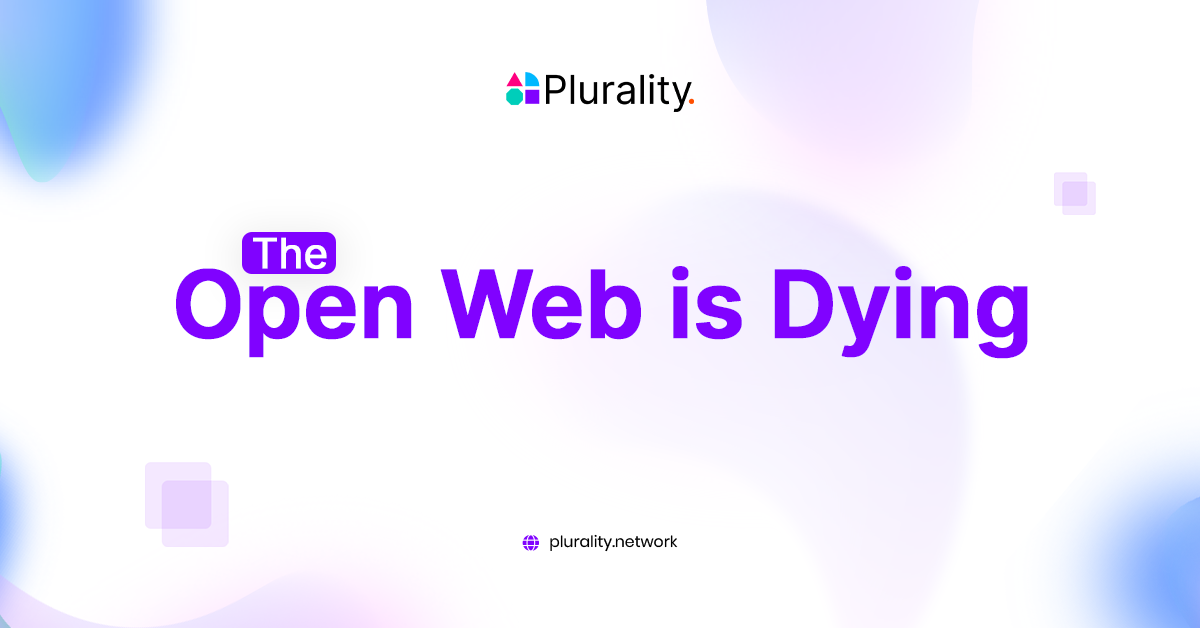The Open Web is Dying
By Alev • August 06, 2024

The term “open web” was first defined in the early days of the internet and was touted as one of its fundamental principles. It promised a decentralized, user-controlled, and interoperable digital environment. However, this principle is increasingly under threat in the evolving internet landscape.
Today, we see less and less of this principle in practice. The internet has become dominated by centralized platforms that control user data, interactions, and access to information.
This article explores the reasons behind its decline and how Plurality Network’s smart profiles can lay the foundation for its revival.
The Decline of the Open Web
Historically, the Internet was built on the principles of openness and interoperability. Early web protocols allowed different platforms to communicate seamlessly, fostering a rich ecosystem of interconnected services. However, this ideal has been eroded over time due to several factors:
- Centralization of Platforms: Major tech companies like Google, Facebook, and Amazon have created walled gardens where user interactions and data are tightly controlled within their ecosystems. This centralization restricts the free flow of information and limits user access to diverse content sources.
- Algorithmic Control: These platforms use sophisticated algorithms to control the content users see, often prioritizing their services and interests. This can lead to echo chambers, where users are only exposed to content that reinforces their beliefs and diminishes the variety of information available on the open web. Moreover, it’s also not easy to understand why someone is seeing which information, and there is no way to change or alter the algorithm if a person wishes to change the way they want the information to be presented.
- Censorship and Filtering: Governments and corporations increasingly use web filtering and censorship to block access to specific websites and information. This can be for various reasons, from political control to protecting intellectual property, but it invariably restricts the web’s openness.
- Internet Blackouts and Restrictions: In extreme cases, some countries have resorted to internet blackouts to suppress dissent and control the flow of information. These actions harm the economy and limit citizens’ ability to access and share information freely.

The Role of Familiar and Unfamiliar Problems
To understand the open web’s significance, it’s essential to differentiate between familiar and unfamiliar problems:
Familiar Problems
Users regularly perform routine tasks, such as checking email, streaming music, or shopping for groceries. Familiar problems have well-defined solutions and user journeys, often handled efficiently by dedicated apps like Spotify, Gmail, or Amazon. These tasks benefit from the streamlined and controlled environments provided by centralized platforms.
Unfamiliar Problems
These are less frequent, complex tasks that require users to seek new information or learn something new. Examples include researching a medical condition, planning a trip, or comparing products for a significant purchase. Unfamiliar problems are better suited to the open web because they involve exploring various sources, perspectives, and types of content.
The distinction between familiar and unfamiliar problems highlights the open web’s strengths and weaknesses. Familiar problems, such as listening to music or checking emails, are often best solved through tightly integrated apps that provide a seamless user experience.
Conversely, unfamiliar problems, which require research and acquiring new knowledge, benefit significantly from the open web’s diverse and extensive resources.
The Promise of Web3 and Plurality’s Smart Profiles
As the open web faces these challenges, Web3 technologies offer hope. Web3 aims to decentralize the internet, returning control to users and fostering an open, interoperable web. Plurality’s smart account are at the forefront of this movement, providing a foundation for a more open and user-centric web.
Smart Profiles for Interoperability
Plurality’s smart profiles allow users to create self-custodial profiles that can be used across multiple platforms. These profiles enable seamless transitions between services, maintain user preferences, and enhance the overall experience.
This interoperability is critical to reviving the open web, as it breaks down the barriers erected by centralized platforms.
Enhanced Privacy and Control
With smart profiles, users retain control over their data and how it is shared. This empowers users to protect their privacy and choose which services to engage with, fostering a more transparent and trustworthy internet.
Building a Collaborative Ecosystem
By promoting interoperability and user control, Plurality helps build a collaborative ecosystem where different platforms can coexist and complement each other. This approach enhances user experience and drives innovation and competition, essential components of a healthy, open web.
Conclusion
The decline of the open web is a complex issue driven by centralization, algorithmic control, censorship, and internet blackouts. However, the principles of Web3, embodied by Plurality’s smart profiles, offer a path towards a more open, user-centric internet.
By embracing these technologies, we can lay the foundations for a web where users have more agency, privacy, and access to diverse information.



